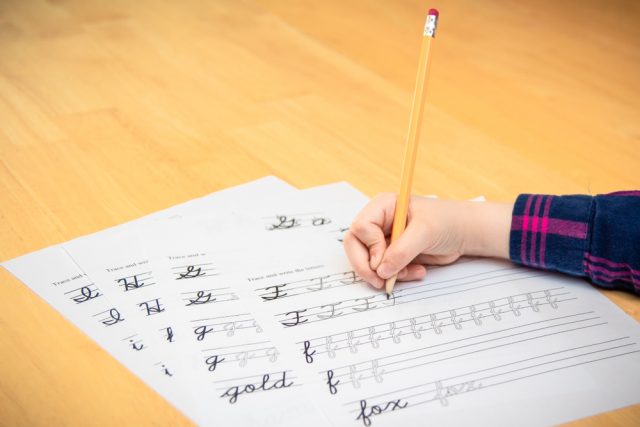Preparation Is Relaxation: Calming Your Nerves Before the School Year Starts
- August 8, 2025
- By Thom Smith
“By failing to prepare, you are preparing to fail.”
– Benjamin Franklin
Stop Worrying & Start Preparing
Back-to-school anxiety isn’t just for students. Teachers, new and experienced, feel it, too. Those creeping worries, the flurry of “what ifs,” and that last-minute scramble the day before school starts… sound familiar?
Here’s my first piece of advice: Don’t. Don’t get nervous. Don’t start spinning hypothetical scenarios in your head or stress about questions you can’t yet answer. It does not help. And it’s not productive. So, what is productive? Preparation.
This is the key. Preparation is part of our profession. We prepare lessons. We prepare for behaviors, for schedule changes, for emergencies, for field trips, for fire drills, for meetings, for everything. So why not prepare for the beginning of the school year before it starts?
This post isn’t meant to raise your blood pressure. It’s meant to do the opposite. I want to show you how just a little bit of purposeful preparation can actually help you relax – so you can enjoy your summer, wherever your happy place may be: lakeside, poolside, grillside, or mountain-top.

Make a Beginning-of-Year Checklist
You probably have those end‑of‑year checklists your administrator provides – the ones that direct you to pack up, turn in forms, file the necessary paperwork and shut your classroom down for summer. They’re helpful, right? They let you walk out that door in June with peace of mind.
So why not make your own beginning-of-year checklist?
It doesn’t have to be complicated. Think of the things you always need to get done before students walk through the door. If you’re new to teaching, ask a few experienced colleagues – they’ll help you build one in no time. Once you make it, save it. Reuse it every year, making minor tweaks as needed.
What can go on your checklist?
- Draft and send your welcome-back letter (reusable with slight edits)
- Set up classroom decor and classroom arrangement
- Update classroom procedures and routines documentation, including your weekly schedule template
- Prep first-week-of-school activities
- Schedule team meetings (grade level, subject, support staff)
- Plan seating arrangements to support classroom management and student needs
- Plan or schedule parent communication events (open house, meet the teacher night)
- Plan/Review your professional goals for the school year and determine steps you can take to achieve them
This checklist becomes your roadmap. Combined with the next tip, it becomes even more powerful.
Know Your Back-to-School Dates (and Plan Around Them)
Find out early when your district or school requires your return. You know those first PD days in August – packed agendas and little time in your own classroom. So find the dates now and block out time before PD to:
- Set up your classroom
- Meet with your team
- Work through your checklist
- Enjoy your last moments of “summer freedom”
You now have a list and schedule to follow it. You’re already soaring above the scramble.
Don’t Let Last-Minute Meetings Derail You
Every year I get pulled into spontaneous meetings on the one day we have to prepare our classrooms. Counselors, special ed teachers, interventionists – they all need something. And it usually hits right when you’re primed to prep your space.
Here’s the fix: initiate contact early.
Once you have your class list, reach out to special ed, guidance counselors, paraprofessionals, and your subject-level team. A quick email asking, “Is there anything I can prepare for now so we’re set in August?” can be powerful. Either meetings get moved up, are shortened, or you’re better prepared going into them.
Organize Your End-of-Year Packing to Help Your Future Self
Schools usually want classrooms packed up for summer cleaning. I tend to shove things out the door (or into closets) in June…and then waste late August hunting for them in chaos.
Make it easier:
- Use predetermined bins or spaces for items you know you’ll reuse
- Label folders or boxes for first-week materials
- Keep “go‑to” items in consistent, accessible spots
Whether you’re a neat freak or someone who changes decor and classroom arrangement haphazardly, this strategy saves hours and reduces stress.
Prepare a Back-to-School Binder (Trust Me on This One)
Some teachers dive into the curriculum straight away. I prefer setting up relationships and routines in that first week. Still, whether you start academics early or not, you should have solid startup plans.
Create a simple back-to‑school binder (or digital folder) with:
- Icebreaker and get‑to‑know‑you activities
- Classroom routines and expectations-building tasks
- Low‑prep academic warm-ups
- A schedule or plan for the first five school days (or even more)
These “timeless” activities require minimal tweaking year after year and provide huge peace of mind. While you’re sitting through training, your brain isn’t worried about what you’re not getting done. You can actually concentrate on your trainings…what a breath of fresh air!
Don’t Fear the Class List
Here it comes – that list of students… along with the whispers, both in June and in August:
“You have her?”
“Oh wow… good luck with that parent.”
“They put those two together?”
You might feel your summer unravel right there.
Here’s where I want to drop another quote:
“Worry is like a rocking chair: it gives you something to do but never gets you anywhere.” – Erma Bombeck
Yes, gathering intel about students is helpful, but letting others’ warnings form your expectations before you even meet them does nothing good. You are going to engage with these students in your own way. You are capable. You are skilled. You can build fresh relationships. Trust yourself. And if you don’t trust yourself, get a mentor who can help you do so!
Enjoy Your Summer (Seriously)
This is your time. Now. The summertime. Just like me, I know many of you need to work summer school, or focus on yard work or house repairs, or volunteer for nonprofits…or all of the above! But there are still those moments you need to capture.
When you can:
- Go to the lake
- Take that hike
- Ride your bike
- Fish with your kids
- Savor that hobby
- Date your sweetheart
Relish it. Live in it. Don’t spoil it by stressing over what’s out of your control.
Take a few minutes to send emails, organize a bin, or jot a checklist. These small acts buy you future freedom – freeing your brain to soak in summer.
Final Takeaways: The Three Keys to Relaxation Through Preparation
1. Create repeatable systems.
Checklists, folders, bin systems. Prep once and use them year after year. That’s built-in ease.
2. Control what you can.
You can’t stop surprise meetings or district PD, but you can organize, reach out ahead, and gather your tools early.
3. Protect your mindset.
Don’t borrow someone else’s dread or let a class assignment darken your peace. You are your own teacher. Start the year with optimism and confidence.
Rest Is Not a Luxury
Here’s your final quote, to send you off into summers and school years refreshed:
“There is no greater gift than to give and receive a good night’s sleep.”
– Maya Angelou
You have control over your preparations, reactions, reflections, and your rest. These small shifts give you big relief, now and in the years ahead. So breathe deeply, check off your list, then… go jump in a lake. You’ve earned it.


